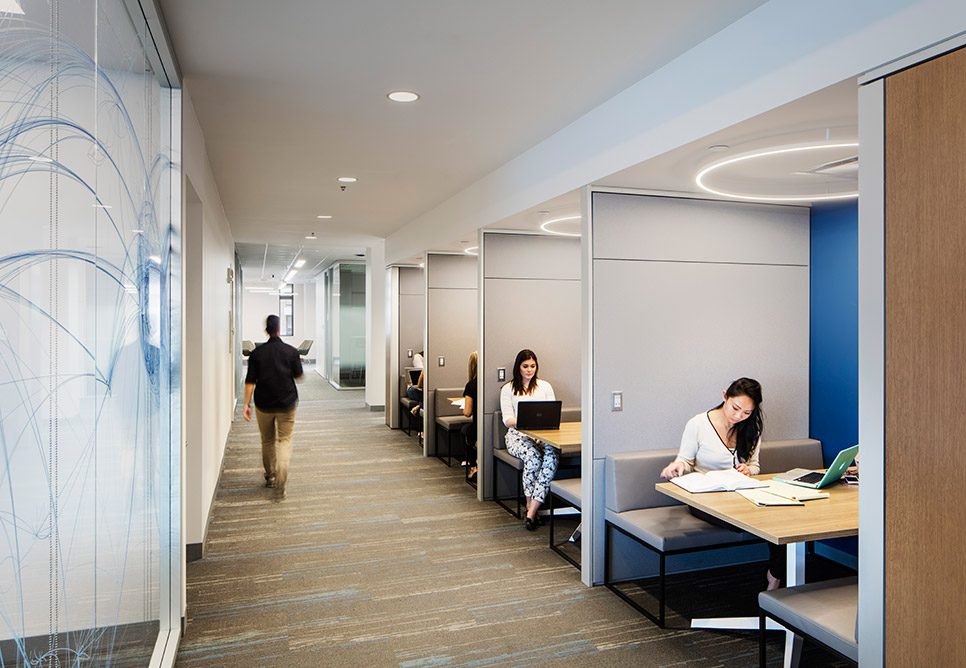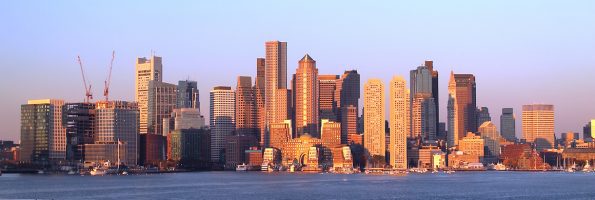Harvard Faculty Discuss Recent Chinese Tariffs, and More – Boston News

Let’s explore some of the most interesting stories that have emerged from Boston business schools this week.
Trade War or War of Words? – Harvard Business School Blog
Following the Trump administration’s recent announcement of 25 percent tariffs on 1,000 Chinese exports, Bill Kirby and Willy Shih, Harvard Business School faculty experts on China, took to the HBS blog to “trade theories on the best path forward for the world’s two largest economies.”
Both experts point to economic shifts in the 1980s, which, not incidentally, was the decade in which Donald Trump started to become a household name. Kirby notes that the major trade distinctions between the United States and Japan, specifically regarding the auto-manufacturing industry, set a precedent. In that, the United States began to firmly invest in Japanese car companies like Honda and Toyota, building their own domestic manufacturing plants. Kirby suspects, however, that the Trump administration may not be as open to that kind of investment. “If Chinese companies wanted to improve access to American markets by investing in the US, would the administration be open to it?” he asks. “They ought to be, in my view. But my suspicion is that that’s not the outcome that this administration is looking for. They’re looking for a miraculous recovery of American-based manufacturing exporting to a Chinese market, not a particularly good match.”
Shih, staying on the topic of the ’80s, offers a different opinion, saying; “I think the real issue is industrial policy on the Chinese side competing with a lack of industrial policy on the U.S. side and the consequences of that. Going back to the mid-1980s, the Chinese government has been mapping a pathway for the country to become a modern country (just as the Koreans, Taiwanese, and the Japanese did before, except on a much larger scale). The Chinese have identified core capabilities that they want to see inside the country, and they’ve been methodically working on that over the last 30-plus years. I’d argue the positive trade balance with the US reflects the progress they’ve made.”
You can read the full conversation between Kirby and Shih here.
An Easy Internship Trick from Kayla Humel ’18 – Simmons Blog
Current Simmons School of Management student body president Kayla Humel, ’18, wrote candidly about the impact of the Student Government Association (SGA) on her recent internship at Puma and future career plans.
“First and foremost, [SGA has taught me] the power of good communication. When the e-board is communicating with one another, event planning is exponentially easier. When SGA is communicating with organizations, processes like budgets occur seamlessly. Good communication is crucial to success in any organization.”
Humel threw her hat in the presidential race because she “saw opportunities to improve processes between SGA and the other organizations on campus. I knew that SGA could create change on campus and I wanted to play a major part in that.”
You ca check out more about her Simmons experience here and watch an interview with Humel about her internship below.
Wield Polarization to Build Positive Change – MIT Sloan Newsroom
MIT Sloan School of Management sustainability initiative director Jason Jay used his recent TEDx talk as an opportunity to share some strategic advice on how to more effectively spark difficult conversations. “The voltage feels so high that we simply avoid conversations out of fear of getting shocked. But I like to think about that polarization as a kind of energy.”
- Draw a contrast between what others might expect you to do and what you’re really trying to do.
- Clarify the values underlying your positions, and do the same with the people you’re talking to.
- Make it clear that you aren’t meeting simply to bargain over these values, but to embrace tension and find new ideas.”
You can check out Jay’s TEDx talk at Hofstra University below and learn more about his work here.
MIT Students Heading to the Vatican, and More – Boston News

Let’s explore some of the most interesting stories that have emerged from Boston business schools this week.
MIT Students Heading to Rome for First Ever Vatican Hackathon – MIT Newsroom
The first of its kind VHacks will take place in Vatican City from March 8-11, bringing in 120 students from various universities around the world to the city-state of the Roman Catholic Church.
“This is not just for the church,” said Sophie Liao, MIT Sloan MBA ’18, in an interview with Meredith Somers from the MIT Newsroom. “This is more about breaking boundaries. Everyone is a migrant, everyone should be involved in this discussion no matter what country they come from.”
“While this is the first event of its kind at Vatican City, using technology to address more than just science isn’t a new thing for the sovereign state’s most famous resident. In a TED Talk last year, Pope Francis suggested how ‘wonderful it would be if the growth of scientific and technological innovation would come along with more equality and social inclusion.'”

Pope Francis made a surprise Ted Talk in 2017, discussing the importance of humility / Photo via Ryan Lash, TED
You can read more about the upcoming VHacks event in Vatican City here.
Sawyer Introduces New Master’s in Marketing – Sawyer Business School
The Sawyer Business School at Suffolk University has announced its new Master of Science in Marketing degree, which prepares students to “approach complex marketing problems, analyze information, and develop high-quality strategic and tactical solutions.”
“Most master’s-level programs in marketing give the qualitative tools pretty short shrift,” says Professor Elizabeth Wilson, chair of the Department of Marketing. “But knowing how to do that kind of research and understanding the whole spectrum of social science research methods is something every employer will value.”

Product management is one of the three concentrations offered in the new Master’s of Marketing program at Suffolk / Photo via nbbj
Three concentrations will be offered as part of the new Master’s program, including: product management, global marketing, and market research and customer insights.
“’I’m excited to see the new MS in Marketing program. The marketing landscape is constantly evolving, and the way brands need to talk to their customers is evolving as well,’ says Victor Davidson, MBA ’12, senior vice president of analytics at SavingStar. ‘The new degree program will empower students to stay on the forefront of these changes and position themselves as top marketers.’”
You can read more about the MSM here.
How News Coverage is Impacting ExxonMobil’s Social Responsibility – Simmons School of Management
Simmons School of Management professor Edward Vieira recently co-authored a study that analyzed ExxonMobil’s corporate social responsibility messages over a 12-year period, from 2002-03, to “determine if there was a relationship between news coverage and subsequent CSR efforts.”
“Corporations that don’t live up to stakeholder expectations may experience a decrease in credibility, reputation, and legitimacy. It’s beneficial for an organization to consistently communicate its CSR actions as well as address culturally relevant events. Therefore, it’s logical that as the world’s fourth largest oil producer, ExxonMobil’s CEO’s letters delivered CSR messages that focused on major external events.”
Read more about Professor Vieira’s research here.
Philadelphia or Boston? Where’s the Best Place to Earn a Part-Time MBA

If you are interested in pursuing a degree in a diverse East Coast city, want to be surrounded by history and culture, and still immerse yourself in growing business community, two main cities come to mind: Philadelphia and Boston.
Both cities are at the center of U.S. history, and continue to be some of its largest centers of commerce and academia, with numerous opportunities to put its stellar education to work.
Surrounded by so many possibilities for professional development, an MBA student in a city like Philadelphia or Boston may not want to put their career and income on hold to pursue a full-time degree.
Thankfully, many of the business schools in Philadelphia and Boston offer part-time MBA programs, allowing students more flexibility as they kick off their careers in these exciting cities. But how to decide which one? We’ll take a look at some of the top part-time MBA programs in each metro to help you choose the right city for you.
Location
Once the capital of the United States, Philadelphia has never stopped being a center of both business and history since the time it played host to the country’s founding fathers. Home to some of the oldest and best universities in the country, Philadelphia has experienced a renaissance in recent years as young talent has become priced out of more expensive metros like New York City and Washington DC. The cost of living in Philadelphia remains fairly low, while the ever-growing business scene in the city offers the opportunity for high earning potential. This year, 14 Philadelphia-area companies made the Fortune 500 list.
Like Philadelphia, Boston has been a center of commerce and trade since the days of the Boston Tea Party. Today, the city is home to nine Fortune 500 companies, including major established firms like GE (13th on the Fortune 500 list) and newer but thriving businesses like Wayfair. However, Boston has a much higher cost of living than Philadelphia. The city currently ranks as the third most expensive city in the country.
Programs
Between the Wharton School of Business and the Harvard Business School, Philadelphia and Boston offer two of the most highly regarded MBA programs in the country. However, both of these schools only offer full-time MBA programs. Students looking for more flexibility in their schedules still have a number of stellar programs to choose from.
Most of the part-time MBA programs in the Philadelphia metro work on a hybrid structure, allowing students to take a combination of classes both online and in person. Many programs also offer students the chance to select majors or concentrations in which to specialize their business education. With a variety of possible concentrations at some of the most highly-ranked part-time programs in the country, students from these programs have gone on to find employment at major firms like DuPont, KPMG, and JPMorgan Chase.
Part-Time MBA Programs in Philadelphia Include
- Lehigh University College of Business and Economics
- Fox School of Business – Temple University
- La Salle University
- LeBow College of Business – Drexel University
- Lerner College – University of Delaware
- Rohrer College of Business – Rowan University
- Rutgers School of Business, Camden
- Villanova School of Business
- West Chester University
Like Philadelphia, Boston’s part-time MBA programs offer more flexibility for students to complete their degree on their own time. Most courses are offered in the evening or on weekends, and can be taken over the course of just two years or up to seven. Programs like the MBA at D’Amore-McKim also give students the opportunity to concentrate in fields such as Corporate Finance, Corporate Renewal, Entrepreneurship, and more.
Part-Time MBA Programs in Boston Include
- Carroll School of Management – Boston College
- D’Amore-McKim School of Business – Northeastern University
- F.W. Olin Graduate School of Business – Babson College
- Questrom School of Business – Boston University
- Sawyer Business School – Suffolk University
- Simmons School of Management
Cost
The tuition costs can vary from program to program, and can also be cheaper if the part-time program is competed online. On average, programs in the Philadelphia metro area can range from $45,000-$65,000 for the degree. The range of costs in Boston can be slightly higher, with some students spending up to $95,000 over the course of their degree.
Jobs
Although the cost of an MBA in Boston may be slightly higher than Philadelphia, the difference in average salary between the two cities may even out concerns of cost. In Boston, the average salary for someone with an MBA degree in a field like finance is $112,000, whereas in Philadelphia it is only around $90,000 per year.
What Are The Most Affordable Boston MBA Programs?

Living in Boston isn’t cheap. According to Expatistan Cost of Living Index, Boston is the sixth most expensive city in North America. On average, people pay between $1,641 (480 sq. ft.) and $2,812 (900 sq. ft.) per month for rent, depending on location and size of the apartment. Then, by the time you add on utilities, food, transportation, personal care and entertainment, living and working in the city can look exceptionally pricey. And costs only increase when you add on an MBA education. That’s why an affordable Boston MBA program is so important.
With the average cost of a top 10 MBA tuition set around $120,000 over two years, breaking the bank may feel especially draining. So, to help you out, we’ve compiled the top five most affordable MBA programs in Boston. Continue reading…
Finding The Best Boston Marketing MBA

Massachusetts may be well known for it pharmaceutical, biotech and education sectors, but it also has plenty of opportunities for Boston marketing MBA students. According to The Ad Club, a trade association for the New England marketing and communications industry, the marketing communications industry in Massachusetts is thriving and is a big contributor to the local economy. Continue reading…
Best Boston MBA Programs For Your Buck

It would be a gross understatement to characterize earning a business school degree as a major investment of time and resources. For the vast majority of applicants, choosing the right school is often a matter of choosing the one they can afford. But if there’s any city in the North America that offers a veritable gallery of business schools for any budget, it’s Boston. We surveyed the Boston scholarship landscape so you don’t have to, and here are the best Boston MBA programs for your buck:
Continue reading…
